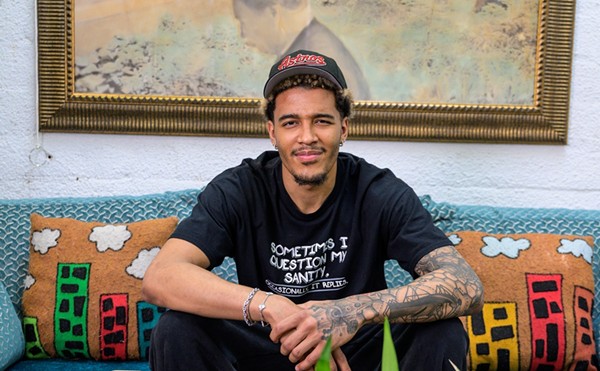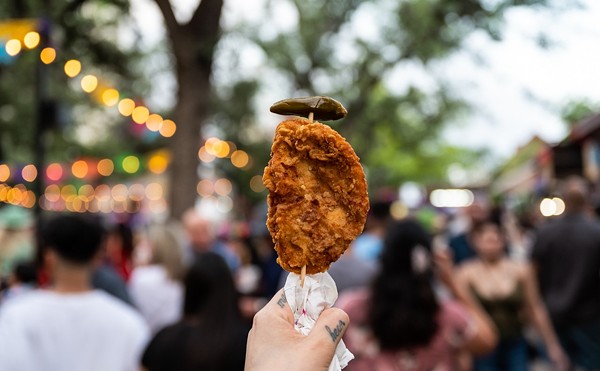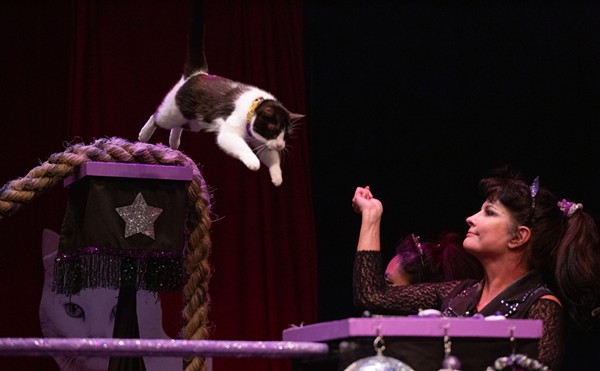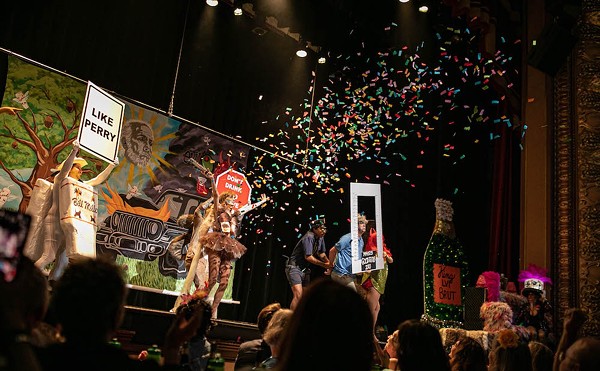STOP THE PRESSES! HOLD THE PHONES! At long last the secret can be told. Our Mayor’s mom has a deep, abiding, and passionate obsession for … poetry. Rosie Castro — mother of Julián and State Representative Joaquín, director of Palo Alto College’s Center for Academic Transitions — reads, writes, and might even publish her own collection of poems one day. Who knew? Not exactly the earth-shattering scoop I was probing for in yet another incisive Current exposé (ahem), but a telling detail about a remarkable woman whose life story is as inspiring and admirable as any LIFETIME Movie of the Week.
When I mentioned to single-parent Rosie that she got the proverbial brass ring in her two Stanford/Harvard-educated, public-servant sons she smiled shyly:
“You can’t do it alone. I had lots of help from my family and friends.”
Indeed, how did an unmarried mother raising twin boys with limited finances, societal inequalities, public-education disparities, and those ever-present delinquency statistics ever manage to pull off such an impressive feat? Not for nothing her calm, self-effacing persona — beneath that composed exterior lay the vaulting dreams, hopes and expectations of a rock-solid visionary.
With sudden gutsy laughter that surfaces whenever a funny notion arises, Rosie Castro comes across as very much the real deal. Neither focus-group sanitized nor censored automaton, she’s sharp, motivated, caring, curious, involved, and still very much the idealist. Like mother like sons?
We settled into a corner table at a small, nondescript Westside café of Rosie’s choosing (trust me, by the time we left everyone there knew the Mayor’s Madre had just lunched.) She handles her ‘First Mom’ status with quiet equanimity, pausing to smile and greet all passersby. When I ask her which one of her sons will become President, she smiles mischievously, “You mean which one will become President first?”
And there, dear reader, is one of the savviest politically correct answer of the year. Enjoy!
“I was born in San Antonio and I’ve lived here my whole life. I was an only child, raised by my mother, who emigrated from San Luis Potosí, Mexico when she was 8. Mom died the year Julián and Joaquín graduated from Stanford. I grew up in the neighborhood around Culebra and Zarzamora, near the Little Flower Basilica. I moved a couple of times when the boys were younger but we spent their junior high to high school years living right by St. Mary’s University. They both graduated from Jefferson High.”
“At the time I was growing up, Mexican-American women weren’t typically involved in politics. When I attended Our Lady of the Lake, I had a mentor, Dr. Margaret Kramer, who introduced me to a lot of local politicians. I got involved with the Young Democrats and later became chair of the Bexar County Raza Unida Party for a time. I ran for city council in 1971 with the ‘Committee for Barrio Betterment.’ I didn’t win but I learned a very valuable lesson: I’m a good organizational person. I like working behind the scenes and pulling it together.
“When I was a kid, growth and progress for all our citizens had pretty much wound down to being nominal at best. Some of that was due to local entities such as the Good Government League and other organizations that practiced some pretty exclusionary back-room politics. Fresh ideas and new faces were kept at a distance. The late ’60s, early ’70s saw a lot of young people pressing for change. The Voting Rights Act wasn’t instituted until 1965. Before then it was difficult to register, there were poll taxes, poverty was rife — people thought they would lose their jobs if they were too outspoken. Today the city can’t pass bond issues without the approval of the South and West Side, whereas before they were largely ignored. A couple of years ago, when the immigration marches were going on around the country, I was impressed at the number of young people, some of them in high school, who were out practicing their First Amendment rights. I have a lot of faith in the younger generation. They have a different battle than we had, but I truly believe leadership steps forward when times call for it.
“I was with Julián and Joaquín’s father till they were about 8 and then we separated. He still lives nearby and they see him, but the boys always lived with me. My mom was a huge part in helping to raise them. I had friends that pitched in, too. When they were young they were so shy I feared they’d never break out of their shell. Other parents would tell me, ‘Your sons are so polite’ or, ‘I see your boys are in Leadership Class in school,’ and I gradually began to think, ‘Well, I must be doing something right.’ I never liked dressing them alike when they were little, so they pretty much avoided that twin predicament. The guys got interested in wrestling early on and a good friend and his wife took them to a lot of matches. Then they wanted to play football and I was worried because I didn’t think they were big enough. I discussed it with a friend who ran a gym and he said, ‘Go for it. Junior high is the best time for them to try it out. They’re not going to get hurt.’ I knew it was important to let them make decisions for themselves. I always felt that discipline should be internal not external. My boys disciplined themselves. They would come home and do their homework, I never had to beg or cajole. They knew what the expectation was and then afterwards they could go and play or do whatever they wanted.
“Like every parent, you hope, you struggle — you never really know anything for certain — but like I tell people, if you love your kids and you act out of love and you give of yourself the time your child deserves, basically the odds are in your favor.
“Most people don’t know that I love the arts and that I love poetry in particular. I got to take Sandra Cisneros’s Macondo writing workshop and I also studied with Naomi Shihab Nye, both fantastic teachers. Some people think that because of my activist background, which for me was a privilege to have helped so many people, somehow I must be biased. If someone takes the time to get to know me they realize that isn’t the case at all. I’ve had Anglo mentors, African-American mentors, and Latina mentors, and I’m grateful and honored for each and every one of them. Paul Thompson used to write a column for the Express-News, and he was particularly hard on me at the time. I never felt I was a radical. I don’t think it’s radical to insure that the rights and privileges of being an American are extended to everybody. Emiliano Zapata said, ‘El respeto del derecho ajeno es la paz — Respect of others rights is peace.’ For many of us that’s kind of the feeling in San Antonio — live and let live. The idea of eccentric people not necessarily seeing and doing things the way others do ties in with the belief that creative people view life in a different manner. This town has an abundance of creativity that comes from survival. I believe our ability to survive creatively will be the key to our future. For a long time I think we had an inferiority complex in San Antonio. ‘Oh gosh, we’re not New York, we’re not L.A.’ And you know what? We don’t have to be anybody but ourselves, and I think that’s a pretty wonderful, evolving, and exciting thing to be!” •















